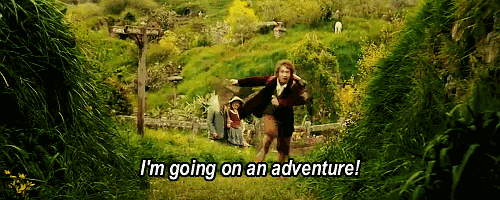Writing and Life Experiences
When it comes to life experiences, there seem to be two thoughts concerning writing:
By the time you’re twenty-five, you’ve had all the life experiences you need to become a writer. You know everything you need to know.
The more life experiences you have, the better a writer you can theoretically become; therefore, have as many life experiences as possible.
The truth, as usual, lies somewhere in the middle. Let me explain.
If you keep up with me at all, you know that my life is in a bit of an uproar. The job that I’ve had the past while (stay tuned for a review of Calla, possibly the best place of employment I’ve ever had the pleasure of enjoying), has come to a close. I’m moving to New Orleans and exploring the wide world of Bourbon Street, along with, of course, the city’s inordinately humongous appetite for booze.
Last month, I gave away 90% of my belongings to reach a more minimalistic lifestyle.
My car, as of recently a fun little sports car, is on the chopping block. Instead, I’m driving a 1989 Toyota 4×4 Pickup.
It’s safe to say that I’m embracing the second point concerning life experiences, as all of this is new to me.
So let’s talk about the pros and cons of each point. For writers especially, I think both points hold water. It’s only when one uses them for a life raft that they start springing leaks.
Point One: “By the time you’re twenty-five, you’ve had all the life experiences you need to become a writer. You know everything you need to know.”
 Calm in a storm. That’s you.
Calm in a storm. That’s you.Pros:
It gives you an excuse to get comfortable. No, not the Twinkie munching excuses for humans you see morphing into barely breathing couches kind of comfortable, but the kind that allows you to create and set a schedule. The kind that lets you knew when you’re writing every morning. That has a steady paycheck. It’s predictable. That can be a strength.
In the writer’s world, this is an underrated bonus. We thrive when we have times dedicated to writing, and when something gets in the way of that time, our day is thrown to shit. The last few weeks, it’s happened to me with a startling amount of regularity, to no end of aggravation.
If you adhere to this train of thought, it’s easy to live in the same city the rest of your life. It’s easy to do *normal* things, like marrying or having children or work the same 9-5 for the next forty years. Your rhythm, such as it is, will putter along uninterrupted. For a writer, that means you’re going to get a lot of work done.
And, really, you want to be a writer, right? Or you are one already. You probably have a vivid imagination to begin with. Knowing that, there’s a decent chance you can watch the sanitation workers gather your trash at the end of the road one morning, let that thought ramble and grow, then eventually transform it into a story of some magnitude.
We’re writers. That’s how it’s supposed to work.
By following this route, you become adept at taking the small and nitpicking them, making them something entirely new. You never need to put yourself at risk or do something outlandish. The annual outing to Disneyworld is as crazy as you get, and there’s something to say for a man like that. My dad is such a person, and he’s made one helluva life by doing so. By twenty-five, he had experienced all the experiences he had needed to do what he wanted to do.
You can as well.
That doesn’t mean, however, that there aren’t cons to following this route.
Cons:
Honestly, you might just not have enough imagination to make this work. And that’s not a slight as much as it is the truth. Some people are more athletic than others, while others are smarter, etc., so it makes sense that the same applies to levels of imagination.
And don’t feel alone. I’m in this camp as well. If I did nothing but the same ole’ thing, day-in-and-out, there is very little chance that I would be able to write something that broke boundaries or retained any semblance of unconventionality. My brain just doesn’t work that way, putting in the overtime hours and throwing out so many ideas that it practically short-circuits.
Rather, my brain is good at taking things and twisting them. At this point, 2016, being an entirely original thinker is overrated anyway – what else is left? We’re just standing on the shoulders of giants, so you might as well get comfortable.
Setting yourself up for a humdrum life is not a death toll for any writer. With the proper amount of willpower, application of imagination, and, most importantly, your reading choices, you can circumvent just about anything. That doesn’t mean, however, that you’re making things any easier on yourself.
Point Two: The more life experiences you have, the better a writer you can theoretically become; therefore, have as many life experiences as possible.

Pros:
This one is easy. I’ll talk about it in the form of an example.
Imagine you live your entire life in the utility room. There’s a washer and drier in there. A microwave. A few shelves worth of odds-and-ends. A dog kennel. A counter. The doors are both locked, you have no communication with others, and the only food you eat is slid through a slot on the wall.
Now, what would that person be like? More specifically, what would he be like as a writer? Weird, for one. Two, probably pretty boring.
Why? Because he lacks life experiences. Take him and compare him to the writer who has scoured the globe, lived in sixteen different cultures, white-water rafted and skydived, been married three times, and has two kids. Which one do you think is going to have a bigger bank of imagination to draw upon?
It’s not ridiculous to think that, rarely, the guy in the utility room might make a better writer than the other guy. Maybe he pontificates philosophically with the best of them. Maybe his lack of life experiences fires his imagination into overdrive. Or maybe he’s just incredibly gifted.
That doesn’t refute, though, the idea that the guy with a ton of life experiences is going to have so many more options for his imagination to pick up and use, even if he is less gifted than the guy in the utility room.
I would probably read the second guy, no offense to the guy sleeping beside the drier.
Cons:
If you’re a writer, then you know, without a shadow of a doubt, how difficult it is to just sit down and write. Rather, most of us are ritualistic creatures. We take our cup of coffee at 6:00. At 6:15, we wash it, get another cup, then sit down and read a few pages from a book. At 7:00, we’re ready to start writing, and you write until some end goal is reached, whether that be a certain word count, chapter count, time limit, or something else entirely.
Much different, however, is the ability to say to yourself, “Aw, hell. I need to write.” Pull out your laptop and just get to working. I CANNOT do that. No effin’ way. My attempts at doing that always end up with me either taking a nap or surfing the web aimlessly while I berate myself for not writing.
And this is an easy trap to fall into if you’re intent on gaining life experiences, whether you’re doing so for the enjoyableness of said experiences or because they indirectly better your writing. You might become so busy conducting life experiences that you forget to actually write, which defeats the purpose of having them in the first place (except for the fact that, well, they’re just fun and good to have in general).
So if you do, as a writer, intend on stocking your life with experiences like a clerk at Wal-Mart stocks the shelves, you must remember what actually brought you to this conclusion. You must continue to find time to write.
In that sense, the person who adheres to point number two has a harder time than the person who adheres to point number one. That doesn’t mean it’s a worse point, though. It just means that writing will require more discipline.
VERDICT:
For a long time – imagine tyrannosaurs chomping into raptors kind of long – I’ve adhered to the first thought: “By twenty-five, you’ve learned everything you need to learn to become a writer.” And why not? Given enough brainpower and imagination, you can create anything. Realistically, that’s all it takes to be an author.
But while it isn’t strictly necessary to have a huge sandbox worth of life experiences, it certainly helps. Instead of using nothing but imagination to create your stories, you can draw upon your life and what you’ve seen of it. The more you’ve seen of life, the easier it will be to do this.
In essence, life experiences bolster your imagination, while your imagination is dependent upon, to a degree, your number of life experiences. And while I fully believe that many greater writers have led somewhat sheltered, hermitical lives, I also believe that a great many more have led a very interesting life. Lived, as it is, to the utmost.
For me, I’ve finally determined that the truth – as with most things – lies somewhere in the middle. I have a good, but not stellar, imagination, so to make up for that fact, I’m going to taste every bit of flavor life has to offer. In a way, those life experiences make up for my shortcomings in imagination. Or, put another way and at the very least, they make the connections between creation and imagination. Instead of having to build a boat to cross, your life experiences act as a bridge.
Whichever one you decide to go with, you can’t go wrong, though. Because at the end of the day, what separates us from the dreamers is putting a pen to paper and letting go. Continue that and it’s hard to fail.
Jonathan
The post Writing and Life Experiences appeared first on Jonathan Lenahan.
Jonathan Lenahan's Blog
- Jonathan Lenahan's profile
- 23 followers



